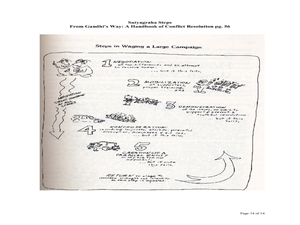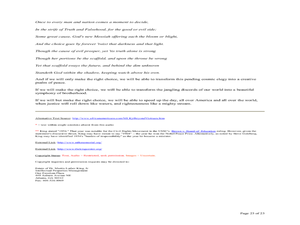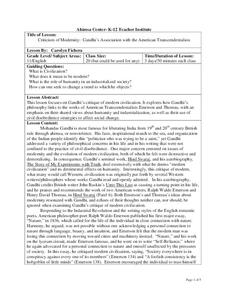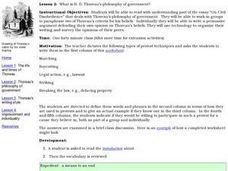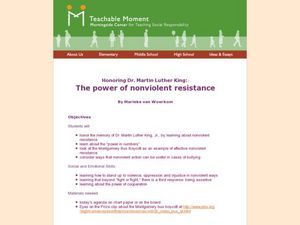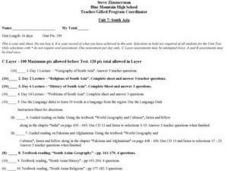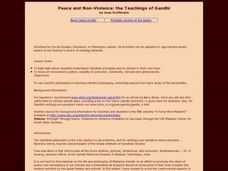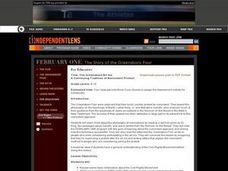Curated OER
Gandhi's Non-violent Revolutions: Examining Tools to Make Non-violent
Students analyze Gandhi's philosophy of nonviolent social change. In this nonviolence and social change lesson, students research a leader from the attached list who practiced nonviolent social change. Students write their own poem...
Curated OER
Gandhi's "Good Life"
Eleventh graders use a Gandhian lens to analyze critically materialism in a capitalist society. In this Gandhian philosophy lesson, 11th graders cultivate awareness, explore materialism and sustainability, examine the idea of 'what is...
Curated OER
Muhammad Ali and his Vietnam War Resistance: Defining Nonviolent Action through Gandhi and King
Students research Muhammad Ali's act of civil disobedience. In this civil disobedience lesson, students research Ali's defiance of the Vietnam War draft and compare his reasoning to Martin Luther King's thoughts on the war. Students...
Curated OER
Understanding the Theoretical Basis for Civil Disobedience
Students analyze Henry David Thoreau's 'On the Duty of Civil Disobedience' and Dr. Martin Luther King's "Letter from Birmingham Jail." For this civil disobedience lesson, students read Thoreau's essay and answer 6 questions for the...
Curated OER
Nonviolent Protest Around the World
Twelfth graders complete research that exposes them to examples of nonviolent protest throughout the modern world. In this nonviolent protest research lesson, 12th graders discover information about signification nonviolent movements...
Curated OER
The Power of Our Stories
Students compare violence to nonviolence. in this peace activity, students tell stories from their own life that show the difference between violence and nonviolence. They listen to examples of Gandhi and Martin Luther King.
Curated OER
A Journey to Paradigm Shifts Guided Through the Lives of Gandhi and King
The students read "The 7 Habits of Highly Effective Teens. Through this study the students will learn what paradigms are, and how to distinguish whether the paradigms they have established in their lives are positive or negative. In...
Curated OER
The Way You Dream: Gandhi and King's Visions of Nonviolence
Students read Gandhi and Dr. King's messages about nonviolence and discuss their visions about loving one's enemies. In this nonviolence lesson, students read Gandhi's "Ahimsa, or the Way of Nonviolence" and Dr. Martin Luther King's...
Curated OER
Chiune Sugihara, Living by Gandhian Principles
Seventh graders read about Chiune Sugihara and analyze the moral situations he faced. In this morality lesson, 7th graders read chapters from A Special Fate, Chiune Sugihara: Hero of the Holocaust and analyze his moral decisions in the...
Curated OER
Gandhi's Alternate View of Women: Changing the Face of Modern Media & Advertising
Eleventh graders analyze the violence of media and advertising on women, as well as Gandhi's views of women. In this women and media lesson, 11th graders Killing Us Softly and Tough Guise as an analysis of media and advertising and their...
Curated OER
Tracing the Idea of Civil Disobedience through Thoreau, Gandhi, and King
Students analyze civil disobedience through history studying Thoreau, Gandhi, and Dr. King. In this civil disobedience lesson plan, students read and analyze excerpts from Thoreau, Gandhi, and Martin Luther King. Students demonstrate...
Curated OER
Criticism of Modernity: Gandhi's Association with the American Transcendentalists
Eleventh graders explore Gandhi's philosophy links to the works of American Transcendentalists Emerson and Thoreau. In this transcendentalism lesson, 11th graders discuss essential questions about civilization and modernity.
Curated OER
H.D. Thoreau's Philosophy of Government
Pupils read an essay by H.D. Thoreau as analysis of his philosophy on government. In this Thoreau analysis lesson, students work in groups to paraphrase two of Thoreau's criteria for his beliefs about government. Pupils write a...
Curated OER
Committing to Nonviolence: A Lesson from Viva La Causa
Students examine the social change movements of the American 20th century. In this nonviolence lesson, students research the work of Mahatma Gandhi, Martin Luther King, Jr., and Caesar Chavez. Students compare and contrast the social...
Curated OER
Civil Disobedience Action Plan
Young scholars investigate incidences of civil disobedience. For this civil disobedience lesson, students watch a video and read a newspaper article on civil disobedience. Then, in groups, they search a current newspaper for examples of...
Curated OER
Thoreau, Gandhi, and Martin Luther King, Jr.
Students explore the concept of non-violent resistance. In this political philosophies lesson, students study the political tactics of Mohandas Gandhi, Henry David Thoreau, and Martin Luther King, Jr. in order to discover how each of...
Curated OER
The Power of Nonviolent Resistance
Students discuss the power of nonviolent resistance in terms of Dr. Martin Luther King and the boycotts that he led. In this nonviolent resistance lesson plan, students discuss their thoughts of nonviolent resistance and how they can use...
Curated OER
Evaluating Nonviolence as a Method of Social Change
During a lesson on Dr. Martin Luther King, Jr, the Civil Rights Movement, and/or nonviolent resistance, students can gather their thoughts in this activity. The questions cover Dr. King's philosophy of nonviolence, and two opinion...
Curated OER
Abolitionists in U.S. History
Young scholars read and discuss excerpts from the writings of Henry David Thoreau, Frederick Douglass and Sarah Parker Redmond. They compare and contrast the views of the three abolitionists concentrating on the experiences and reasons...
Curated OER
Nonviolent Resistance: Gandhi and King
Students use the internet to research the major events and dates of Mohandas Gandhi and Martin Luther King, Jr. In groups, they use this information to create a poster to present to the class. They reflect on how these two men were...
Curated OER
South Asia
High schoolers study South Asia. They complete various activities including answering questions following lectures, researching current events articles, viewing videos of Gandhi, South India, Pakistan, and Nepal. They select activities...
Curated OER
Peace and Non-Violence: the Teachings of Gandhi
Students study the Gandhian philosophy. They define certain elements such as power, beauty and discuss what they know about the struggle for independence in India. Finally students collaborate to discuss Gandhian principles to extend...
Curated OER
The Greensboro Sit-Ins: A Continuing Tradition of Nonviolent Protest
Pupils watch a video about nonviolent protests during the Civil Rights Movement. They discuss and write about the Greensboro sit-ins while deciding the effectiveness of this type of protest.
Curated OER
What is the Role of Civil Disobedience Today?
Young scholars examine the meaning and use of civil disobedience. They decide whether civil disobedience is a viable form of protest in contemporary times after studying the acts of Rosa Parks.


